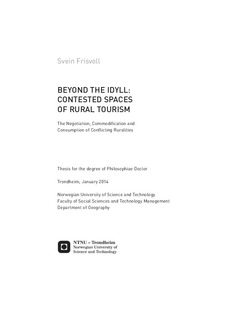| dc.description.abstract | The Norwegian countryside is profoundly changed by seemingly polygonal and contradictory developments. Some areas experience growth and revitalisation, others are depopulating. Employment in the primary and secondary industries - the traditional stronghold of the rural economy- is reducing, while employment in the tertiary sector is increasing. Within the primary industries a manifold of developments could be observed: foreclosure, restructuring from smaller to larger units and reorientation of production, in which other productions and products come into fashion (e.g. products with added cultural value such as 'local food'). The so called 'cultural economy' subjects rural resources to commodification, amenity-led real estate developments and nature/landscape protection. Contemporaneous with this seemingly 'low impact resource use' rural resources are also subject to a renewed interest from high impact resource use (e.g. neo-productivity, energy production, a renewed interest in mining).
It is to this rural polyphonic, rural policy addresses rural tourism as a countryside saviour. Hopes for rural tourism as a provider of sustainable growth in a countryside in which the traditional economy is replaced with a consumption-based economy, are partly rooted in ideas
On cultural consumption. In rural tourism, tourism entrepreneurs commodify and commercialise rural representations, traditions and sceneries- satisfying a perceived demand for the idyllic and authentic. A pressing issue then is the extent to which the 'idyllic and authentic rural' are compatible with the realities of a rapidly changing countryside.
In the PhD-project this is addressed by investigating the negotiations that take place between different ruralities in changing rural spaces commercialised and consumed by rural tourism. The research builds from qualitative and quantitative data generated by fieldwork in two Norwegian rural communities, 'Codville' and 'Farmington'. The interplay between rural representations, a changing countryside and rural tourism is approached from a Halfacreean understanding of rural space. Contributions are made to the understanding of rural spacer, authenticity in tourism, and local food in tourism.
The project has been funded by the Norwegian Research Council through Centre for Rural Research's strategic program CULTOURFOOD (2007-2010) (Grant no 179477/130). | nb_NO |
